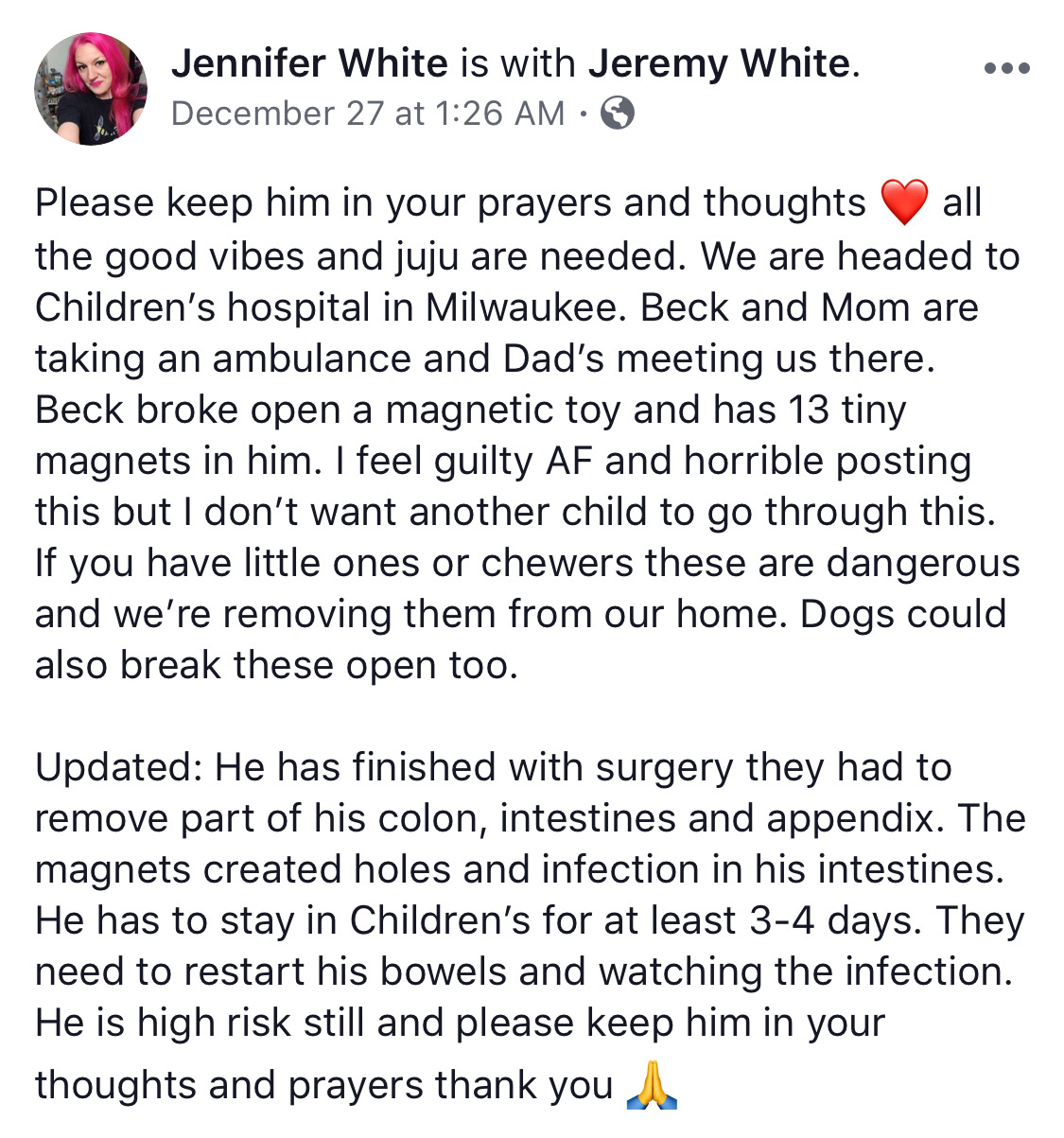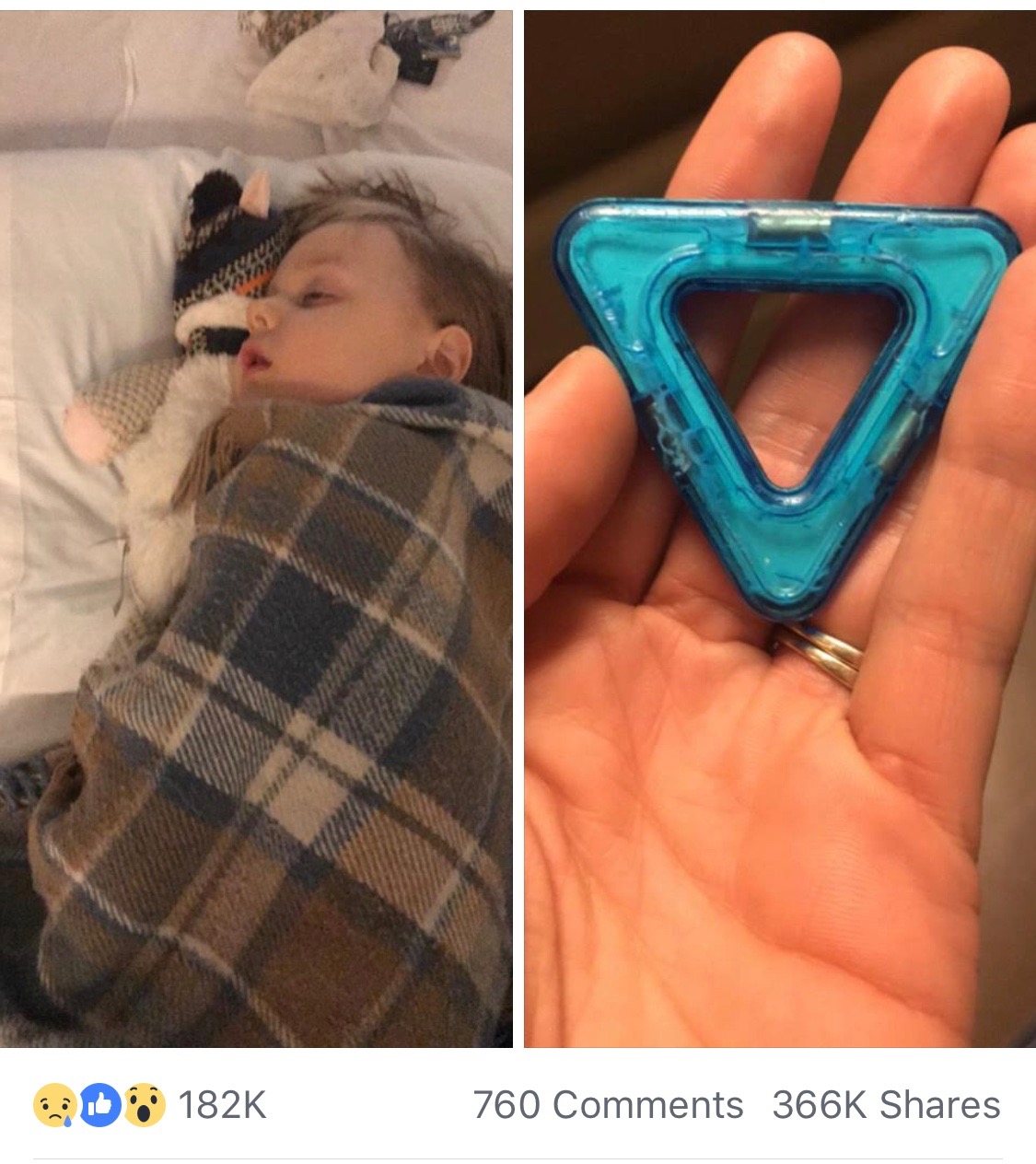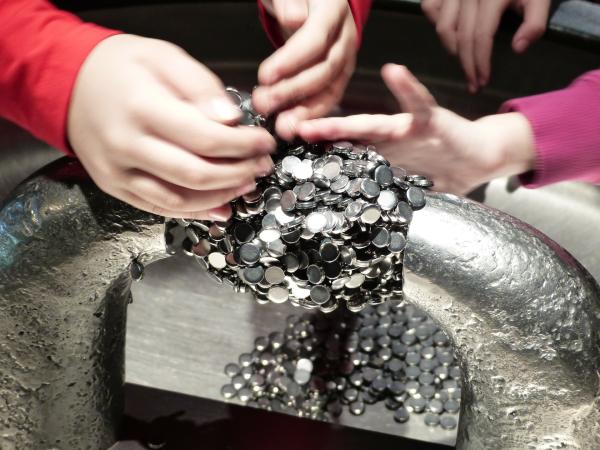A mother’s agony is raising awareness about an important topic that landed her young son in the hospital for an emergent removal of parts of his colon, intestine and appendix. After the boy accidentally ingested thirteen small magnets, they - due to the force of their strong attraction - stuck together eroding bowel and creating holes (aka perforations) that led to an infection. The mother posted her harrowing account on Facebook:


Jennifer White went on to tell Fox 6 Now,
“I don’t want another mother or father to go through this...We had made sure that he was old enough, the age on the box, I chewed it myself. It sounds crazy but I have special needs children and sometimes you need to a little extra and I did those things to make sure… if you have them in your home make sure you know when they’re being played with, don’t let the kids have them by themselves.”
She raises two especially significant points. First, the risks of accidental swallowing of foreign objects is higher in a home with small children - as they developmentally mature they rapidly become more mobile, curious and stimulated by their environment so they put everything they can find in their mouth, up their nose etc. Second, there is an added challenge of keeping those with special needs safe. Accidental or intentional ingestions of dangerous materials extends to all ages, consider the precautions necessary for elderly patients with dementia (remember the issues with Tide Pods, see here).
Foreign bodies in the body pose a hefty healthcare burden
Foreign body ingestion and inhalation through accidental or intentional trauma represent a large chunk of the preventable injury health care burden - which is not only costly in monetary terms but also in degrees of anguish and often unnecessary suffering. Though the items and circumstances vary, no age is spared.
To learn more, review my series on Inanimate Objects In Orifices (eyes, ear/nose/throat, penis, vagina, anus/rectum) and Animate Objects in Orifices: The Airway.
To learn more about the dangerous and preventable, click on these links:
-
As Far As Ingesting Foreign Objects Go, Magnets Worse Than Many
-
Accidental Or Intentional, Tide Pods Meant For Laundry Not Mouths.
Why magnets are so bad
Magnets are particularly worrisome, especially the high-powered types that often are in adult products. Kids may think they are candy, and despite being tiny they may put an excessive number in their mouth. Teens pretend they are tongue piercings. When it comes to hazardous objects to swallow, magnets are up there in terms of high risk items - e.g. batteries corrode, sharp objects can pierce bowel.
A recent “study” further highlighted the profound spectrum of consuming inanimate objects. In it, the authors ingested smooth, round plastic Lego heads and sifted through their own stools to affirm passage. They did so to learn more precise transit times so they could comfort parents during such occurrences. The Lego heads didn’t cause harm because they don’t possess the qualities of the more alarming products previously mentioned - which still doesn’t mean anyone should try what the researchers did.
In As Far As Ingesting Foreign Objects Go, Magnets Worse Than Many, I wrote about a Colorado toddler who required emergency medical intervention after ingesting 28 high-powered buckyball magnets. In that case of 2-year-old Ella McBrien, the magnets conjoined in a circular manner that began to erode and obstruct bowel. An early hole was being formed. Thankfully, two attempts with specialized endoscopy solved the problem and prevented major surgery that could have warranted removal of substantial portions of bowel. Losing segments of bowel can lead to longer term issues.
Gastrointestinal perforations can occur anywhere throughout the GI tract, e.g. esophagus, stomach, intestines, colon etc. When there is such a rupture, the contents contained within that purposely confined space get released freely into the abdomen or chest. Bowel contents --albeit stool, bile, stomach acid, food, bacteria or free air-- released into the sterile environment of its surroundings cause tremendous damage, toxicity, incite inflammation and infectious spread. In addition, they can impede neighboring structures. Rapid intervention is often necessary to prevent overwhelming infection (aka sepsis), tissue necrosis, shock, even death. Conservative measures like bowel rest from not permitting eating or drinking, intravenous fluids or antibiotics are initiated with other supportive efforts.
The bottom line
If you think there has been an accidental or intentional ingestion, then seek immediate medical care. The earlier there is an intervention, the better your chances of a more optimal prognosis. Know who is in your home and what measures might be most reasonable to keep everyone safe and free from unnecessary harms. In particular for those with young children or family members with medical conditions that involve altered mental status and confusion, it is in everyone’s interest to err on the more cautious side. Discussing child-proofing and the like with your doctor is a wonderful first step to spare you or a loved one a preventable injury.




